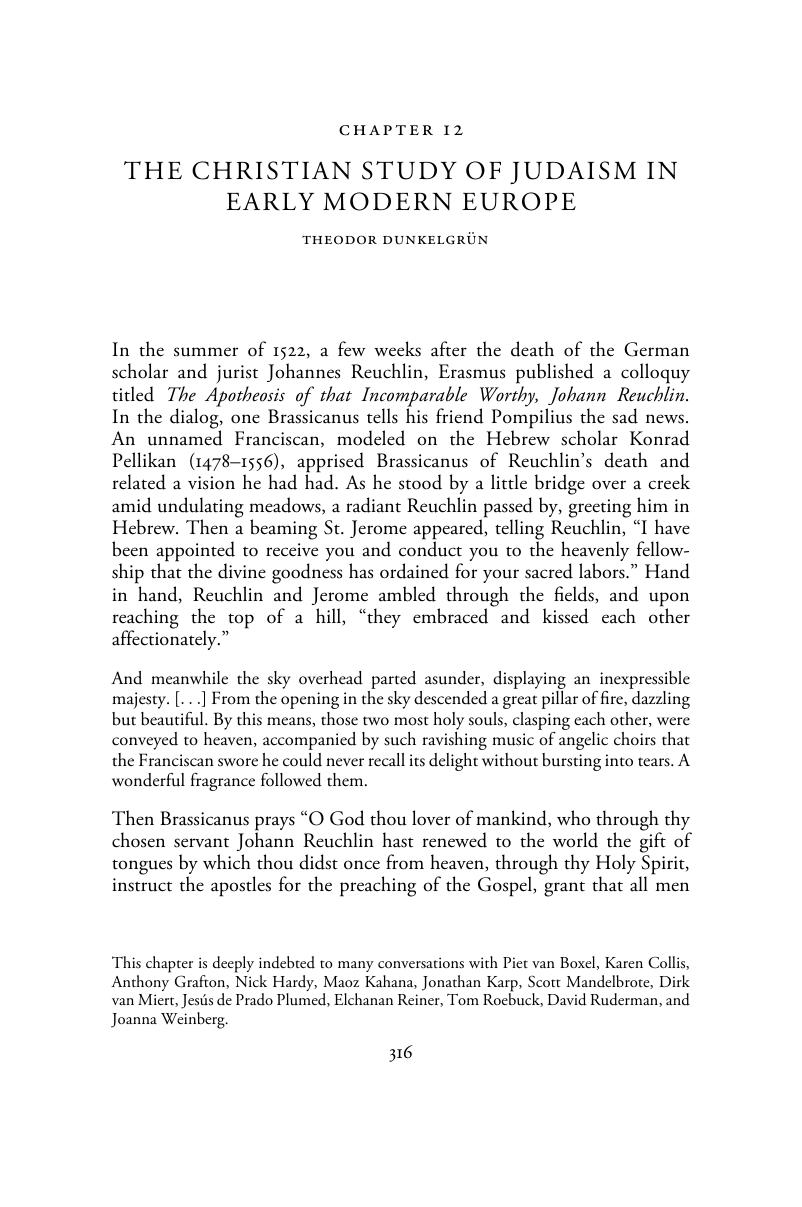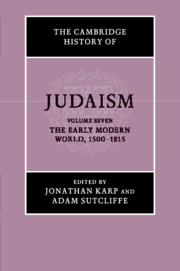Book contents
- The Cambridge History of Judaism
- The Cambridge History of Judaism
- The Early Modern World, 1500–1815
- Copyright page
- Dedication
- Contents
- Figures
- Additional material
- Introduction
- Part I The World of Early Modern Jewry, c. 1500–1650
- Part II Themes and Trends in Early Modern Jewish Life
- Chapter 7 Iberia and Beyond
- Chapter 8 The Establishment of East European Jewry
- Chapter 9 Linguistic Transformations
- Chapter 10 Continuity and Change in Early Modern Yiddish Language and Literature
- Chapter 11 Jewish Book Culture Since the Invention of Printing (1469 – c. 1815)
- Chapter 12 The Christian Study of Judaism in Early Modern Europe
- Chapter 13 Rabbinic Culture and the Historical Development of Halakhah
- Chapter 14 Discipline, Dissent, and Communal Authority in the Western Sephardic Diaspora
- Chapter 15 Education and Homiletics
- Chapter 16 Dimensions of Kabbalah from the Spanish Expulsion to the Dawn of Hasidism
- Chapter 17 Magic, Mysticism, and Popular Belief in Jewish Culture (1500–1815)
- Chapter 18 Sabbatai Zevi and the Sabbatean Movement
- Chapter 19 Science, Medicine, and Jewish Philosophy
- Chapter 20 Port Jews Revisited
- Chapter 21 Jews in the Polish–Lithuanian Economy (1453–1795)
- Chapter 22 Jewish Piety and Devotion in Early Modern Eastern Europe
- Chapter 23 The Rise of Hasidism
- Chapter 24 Enlightenment and Haskalah
- Chapter 25 Women, Water, and Wine
- Chapter 26 Jews, Judaism, and the Visual Arts
- Chapter 27 Musical Dilemmas of Early Modern Jews
- Part III The Jewish World, c. 1650–1815
- Index
- References
Chapter 12 - The Christian Study of Judaism in Early Modern Europe
from Part II - Themes and Trends in Early Modern Jewish Life
Published online by Cambridge University Press: 10 November 2017
- The Cambridge History of Judaism
- The Cambridge History of Judaism
- The Early Modern World, 1500–1815
- Copyright page
- Dedication
- Contents
- Figures
- Additional material
- Introduction
- Part I The World of Early Modern Jewry, c. 1500–1650
- Part II Themes and Trends in Early Modern Jewish Life
- Chapter 7 Iberia and Beyond
- Chapter 8 The Establishment of East European Jewry
- Chapter 9 Linguistic Transformations
- Chapter 10 Continuity and Change in Early Modern Yiddish Language and Literature
- Chapter 11 Jewish Book Culture Since the Invention of Printing (1469 – c. 1815)
- Chapter 12 The Christian Study of Judaism in Early Modern Europe
- Chapter 13 Rabbinic Culture and the Historical Development of Halakhah
- Chapter 14 Discipline, Dissent, and Communal Authority in the Western Sephardic Diaspora
- Chapter 15 Education and Homiletics
- Chapter 16 Dimensions of Kabbalah from the Spanish Expulsion to the Dawn of Hasidism
- Chapter 17 Magic, Mysticism, and Popular Belief in Jewish Culture (1500–1815)
- Chapter 18 Sabbatai Zevi and the Sabbatean Movement
- Chapter 19 Science, Medicine, and Jewish Philosophy
- Chapter 20 Port Jews Revisited
- Chapter 21 Jews in the Polish–Lithuanian Economy (1453–1795)
- Chapter 22 Jewish Piety and Devotion in Early Modern Eastern Europe
- Chapter 23 The Rise of Hasidism
- Chapter 24 Enlightenment and Haskalah
- Chapter 25 Women, Water, and Wine
- Chapter 26 Jews, Judaism, and the Visual Arts
- Chapter 27 Musical Dilemmas of Early Modern Jews
- Part III The Jewish World, c. 1650–1815
- Index
- References
Summary

- Type
- Chapter
- Information
- The Cambridge History of Judaism , pp. 316 - 348Publisher: Cambridge University PressPrint publication year: 2017
References
Select Bibliography
- 2
- Cited by



